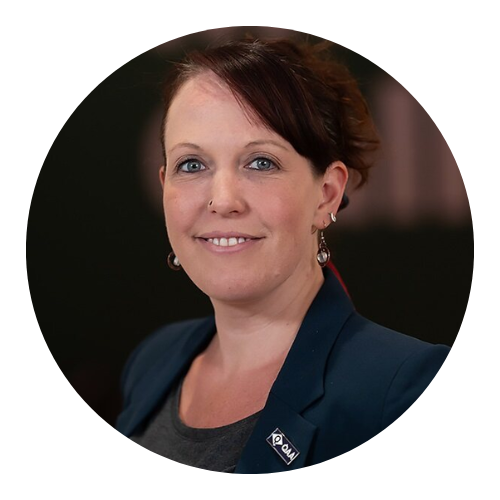Following their recent trip to the AAA Conference, Gqeberha, South Africa, we caught up with Rachel and Sam to get their accounts of the trip.

One of the things we both love about AHEP is the fantastic opportunities it offers to be involved in the sector, and none was more fantastic than being able to visit South Africa to attend and present at the Association of Academic Administrators conference in Gqeberha (formerly Port Elizabeth).
Rachel: After a very long flight and early morning arrival I was able to take advantage of a morning sight seeing in the city to begin with. It’s a beautiful place on the shores of the Indian ocean and the sunshine just added to the sense of idyl. Gqeberha is a very warm and welcoming place, and this warm welcome was even more evident on my trip to Nelson Mandela University.

NMU has a progressive ethos and clear values its shares with its students. The international student recruitment team hosted my visit, and provided background on their work and the university more generally before taking me on a campus tour.
The university has many familiar challenges that are replicated across the sector in South Africa, including high fees, cost of living issues for their students and a need to find third stream income though some of these are more stark than in the UK. Political uncertainty plays its part in their strategic considerations.
The university is female-led, something it is (rightly) very proud of and it champions progressive values on gender, inclusivity, environmental stewardship, social justice and diversity. It also encourages Ubuntu- compassionate citizenship and a people-centred ethos. This was really visible on the campus tour- as part of this most of the suppliers on campus are student enterprise, particularly the outside catering. This also helps students earn a wage while studying. It was visible in an installation on campus about the Israel-Palestine situation- this for many NMU students resonated with echoes of the Apartheid regime.

My personal highlight of the campus tour was the nature reserve- NMU is the only university in the world with a nature reserve as part of its campus. It was there before the university and the staff shared that there was a sense of the university being on the reserve not the other way round! The reserve has several big cats, bird life, seriously mischievous monkeys and herds of springbok and zebra amongst others. To my total delight my visit finished with the sight of a herd of zebra happily grazing not far from the centre of campus.
Sam: Following hot on Rachel’s tail, I arrived in Gqeberha later that afternoon – too late, alas, to see the zebra at NMU but in time to see the sunset from a bar at the beach and to finalise our plans for our conference presentations. We’d been given some useful guidance from last year’s attendee from AHEP, Emily Maddock Khan, so had a sense of what to expect.






Rachel: We were kindly hosted by the AAA Board in the evening for dinner on the Wednesday where we talked all things higher education and professional services. AAA is keen to drive the professionalisation of academic administration in the South African tertiary sector and discussion around the rebranding of AHEP to reflect this change in the UK offered insight for AAA on how this had developed.
We were then into the serious business of attending the AAA conference. Sam did a great job of kicking off the conference on the Thursday with his presentation on the past, present and future of UK higher education. Many of the themes and challenges really resonated with the audience, in particular those of political uncertainty, a funding model that isn’t delivering and the burden of regulation.

Although it was daunting to open the conference to a huge room of 380 delegates, we received a really warm welcome and it was interesting to see how some of the themes of my talk resonated with the South African audience. I’d surveyed AHEP members and colleagues across the sector before setting off from the UK, to ask what they thought about the state of the sector at present. I was unsurprised to see that the vast majority of colleagues expected hard times ahead over the next 6 months; though the mood was somewhat more optimistic over the next 5 years, with around 40% of respondents envisioning brighter times ahead.
This contrasted in quite an interesting way with the South African audience: the overwhelming feeling was that things would stay roughly the same within the sector over similar time periods. This was despite the upcoming general elections (which subsequently delivered something of a historic result).
Rachel: Sam is a hard act to follow but Professor Bawa struck a chord with his question about placing the social purpose of higher and further education back at the heart of institutions, and on how to develop systems to combat fraud in South African institutions. It’s the sort of conversation that feels missing in the UK sector sometimes, are we loosing sight of the critically important social purposes we serve? In the afternoon Tamara Goliath’s energetic and enthusiastic presentation was a real highlight, her passion for the sector and its need to professionalise simply shone through, I couldn’t help but join in the cheering throughout!
Sam: Professor Bawa’s thoughts on corruption and what it can look like made me wonder if sometimes we can be complacent about our exposure to it in the UK sector. While there is no doubt we do not suffer from it to the same degree, it reminded me of the importance of robust policies for procurement, recruitment, and academic standards – and the need to regularly review our practice to ensure it meets the highest professional standards.
We broke out into smaller groups for workshops delivered by other delegates. The discussions I attended included a discussion of project management methodologies being applied to higher education (I remember similar conversations happening only a few years ago in the UK!) and a debate on the relative importance of human interaction versus technology investment within institutions. The latter gave me cause to reflect upon how things have changed within the UK in recent years and how important it is to maintain the human face of institutions in the context of squeezed budgets and centralisation.
And I agree that Tamara Goliath’s presentation was hugely impactful. I’m fairly sure she will be a future leader of the AAA, if not a Vice-Chancellor!

Rachel: Although we were offered a pass on the team building exercise Sam and I decided to take the opportunity to say ‘Molweni’ ‘Awe’ ‘Sonibonani’ ‘lumela’ and join in and make some friends anyway, creating a short narrative video that gave us the excuse to introduce ourselves and take a selfie with everyone attending the conference. We were surprised and delighted to a win a small prize for our participation! The evening gala dinner was a joyful event filled with conversation, drinking and dancing and some fantastic outfits on the theme of ‘beach party’. Even Sam was persuaded on occasion onto the dance floor!
Sam: Rachel got a commendation the next day for her dancing – amongst many enthusiastic participants – and I’m glad to say that the conga made an appearance, possibly even putting the AHEP conga to shame.
Friday arrived very quickly – but there was no time to stay in bed, as Rachel gave her plenary on ‘equipping higher education administration and professional services staff to respond to the challenges of artificial intelligence’. Like for most UK audiences, AI was a new – but exciting – topic. Rachel discussed the futility in detecting (and therefore banning) the technology.

The risk of misuse linked nicely with Prof Bawa’s talk the previous day – and Rachel asserted that “responding to Artificial Intelligence needs another form of AI – Academic Integrity. There were some important reflections not only on the governance of AI but how we can develop AI literacy within a transparent framework. There was also discussion on what AI would mean for the future employment market and the implications for higher education professionals – a little scary, but with some solid next steps for the audience to take away.
Rachel: Friday was wrapped up with the AGM and an inspirational speaker, who finished with the most critical point- without professional services staff none of the teaching and learning could happen. Professional services staff are integral to our institutions, our sector and in turn the nation’s economy and growth strategy and we should celebrate and be proud of our continued contribution to education.

Sam: As Rachel had to dash for her flight, it was my turn to visit Nelson Mandela University – though I arrived to find campus rather deserted. I felt rather at home when my hosts explained that there was a train strike that day and teaching had been flipped online!
We had a lively discussion about the business model of South African universities and also talked through the approvals process for new programmes. Due to the nature of the funding, new programmes (or major modifications) need sign-off from three different governmental committees – a process that can take years. Staff in the Registry were busily preparing for an audit coming up to check their compliance.
I was also interested to hear about NMU’s internationalisation strategy and its current focus on Africa; and I especially liked their focus on ‘humanising pedagogy’ which linked to the discussions we’d had the previous day.
Afterwards, I was able to tour the parkland campus – which in some ways reminded me of the York and Hull campuses from back home – albeit with more palm trees. Qhama, the Business Partner who showed me around, had attended NMU himself and pointed out the lecture theatre where he had attended his very first class.
With a spare day before my flight home, I was lucky enough to be able to venture out to Addo National Park for a safari. This was an absolutely incredible experience – there were animals everywhere and I’ve shared some of the more photogenic ones here. I even got to see a lioness hunting a warthog (unsuccessfully, I should add).





The next day, it was sadly time to fly home – a journey of about 28 hours door to door, which gave me plenty of time for reflection on an amazing experience and huge amounts of learning and development.
We both learnt a huge amount, and it was a privilege to have the opportunity to compare what’s going on in the UK with other sectors internationally, and be reminded of some of the shared fundamental values of education no matter where it is delivered. A huge thank you from the both of us to our wonderful hosts at AAA; AHEP for providing such an incredible opportunity; and our institutions for giving us the time to visit this amazing country. We’d both recommend future opportunities like this to any AHEP member
The latest from AHEP:

